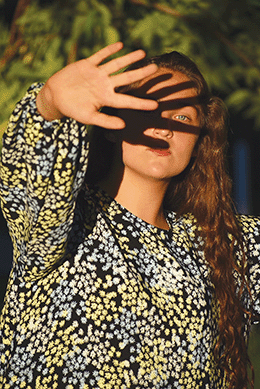By DORIS RUBENSTEIN
Over many years, American Jewish World readers enjoyed a spring issue that included a supplement with award-winning stories, poems and photography from the Keren Or arts competition. This year marks the 20th year for the program, and it warrants a look back and a look forward.
Keren Or is Hebrew for “ray of light.” The founders of the program, the late Jerry and Eileen Siegel, felt that way about their only daughter, Karen Siegel Jacobs, who died a tragic death when she was in her early 30s. Karen brought light and happiness into the lives of everyone who met her.

The Siegels were members of Adath Jeshurun Congregation and decided to create a fund there to provide awards for young Jews for their efforts in the arts. Art had been an important part of Karen’s life and therefore gave the Siegels a sense of lasting meaning to their daughter’s life — and a purpose for their own lives, according to their son David. The fund and program were to be based at Adath Jeshurun.
David recalls that Keren Or was meant to recognize Jewish teens for achievements in fields outside of sports. “Poets and photographers at that age don’t get many opportunities for recognition,” he explained. His parents wanted something “unique in that Keren Or is designed to unite kids and parents from every corner of the Twin Cities Jewish community, which rarely happens otherwise. That is really something to celebrate: their kids’ creativity!”
The first awards were given in 2004. After a few years, though, the Siegels realized that the administration of the program by Adath Jeshurun put a lot of pressure on the staff there. Since the program had received some grant money from Rimon: The Minnesota Jewish Arts Council, it was natural for Jerry to reach out to Rimon’s then executive director, David Jordan Harris.
“After nine years, Eileen and Jerry called me for advice,” Harris recalled. “They were getting older and didn’t feel that they could continue running the contest by themselves. Should they let the project wind down or could it be transferred into another organization’s hands? I loved what they had created and the way in which it lifted up the creative spirit among young people. I suggested that Rimon could be paid to manage the contest. We agreed to give it a shot. During its 10th anniversary season, the Siegels and I co-implemented the contest. That year was invaluable to me because I got to hear Jerry’s thinking on all matters related to the contest. When I would run into conundrums in later years, I would ask myself, ‘What would Jerry do?’”
Judges play an important role in Keren Or. They must have talent and be able to recognize talent, yet judge without bias. Twenty years ago, the Siegels didn’t have to search far to find one of their first judges: writer and teacher Kathleen Coskran. She recalls that “the Siegels were our neighbors and became dear friends when we moved here in 1974. Karen was our first babysitter. So, when Jerry and Eileen created Keren Or to memorialize their talented daughter and asked me to be one of the judges, I was honored to do so.
The stories, poems and essays were always interesting, sometimes poignant or funny, and a wonderful example of budding writers exploring their craft. I particularly enjoyed meeting at Jerry and Eileen’s apartment with Jackie Kramer (who was also a judge for the literary submissions) to discuss the submissions and settle on the final winners. The awards event at Adath Jeshurun was a highlight … to see in person these talented, earnest young people receive their prizes.”
The most important people in the Keren Or competition are the students. Solomon Polansky, an eighth grader at the Blake School, in 2010, had this to say about winning the poetry award: “I am a practicing engineer —mnot so much in the liberal arts these days. Even in grade school, I felt drawn toward STEM fields. Entering a poetry contest may not have seemed like a natural next step. And winning, even more unlikely. I entered the contest with a poem about the sport of fencing — an activity I was very passionate about at the time (and still play occasionally to this day). So, to win the contest was meaningful in two ways: First, it recognized another side of myself — my creative writing. Secondly, it shared my positive experience with fencing with a larger audience.”
Sarah Routman, interim executive director of Rimon, has announced that there will be a communitywide celebration of this 20-year milestone — along with this year’s award presentations — from 2 to 4 p.m. Sunday, May 5, at the Minnesota JCC’s Sabes Center in St. Louis Park. She encourages all past winners and their families to attend.
(American Jewish World, April 2024)




















